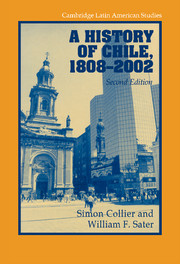Book contents
- Frontmatter
- Contents
- List of maps
- Preface to the Second Edition
- A note on geography
- CAMBRIDGE LATIN AMERICAN STUDIES
- PART I Birth of a nation-state, 1800s–1830s
- PART II The rise of a republic, 1830s–1880s
- PART III The nitrate era, 1880s–1930s
- PART IV Industrial advance and the dawn of mass politics, 1930s–1960s
- 9 The Radicals, the General of Hope, and the Lion's Son, 1938–64
- 10 The industrial impulse, 1930s–1960s
- PART V Democracy and dictatorship, 1960s–2000s
- Glossary of Spanish terms
- Initials and acronyms
- Further reading
- Index
9 - The Radicals, the General of Hope, and the Lion's Son, 1938–64
Published online by Cambridge University Press: 05 June 2012
- Frontmatter
- Contents
- List of maps
- Preface to the Second Edition
- A note on geography
- CAMBRIDGE LATIN AMERICAN STUDIES
- PART I Birth of a nation-state, 1800s–1830s
- PART II The rise of a republic, 1830s–1880s
- PART III The nitrate era, 1880s–1930s
- PART IV Industrial advance and the dawn of mass politics, 1930s–1960s
- 9 The Radicals, the General of Hope, and the Lion's Son, 1938–64
- 10 The industrial impulse, 1930s–1960s
- PART V Democracy and dictatorship, 1960s–2000s
- Glossary of Spanish terms
- Initials and acronyms
- Further reading
- Index
Summary
The political crisis has reached an unbearable point. Economic and moral bankruptcy, the result of a long period of political activity undertaken at the service of the privilege and greed of a partisan circle, has greatly accelerated the process of decomposition.
– President Carlos Ibáñez (1953)The successful restoration of constitutionalism by Arturo Alessandri after 1932 was perhaps the first step toward widening the Chilean democratic tradition. Politics itself was no longer the exclusive preserve of the traditional upper class; the parties themselves increasingly conducted their rivalries within a framework of mass politics. Too much should not be made of this. The widening of democracy still had some way to go in the 1930s and 1940s. With women (until 1949) and illiterates (until 1970) denied the vote in national elections, the electorate did not seriously expand much before the 1960s. Moreover, the 1925 Constitution had institutionalized proportional representation, and the complex system adopted (invented by the Belgian, Victor D'Hondt, in the late nineteenth century) both encouraged party fragmentation and limited the ability of insurgent parties (particularly those of the Left) to challenge the existing order. In addition to this, the government long refused to reapportion electoral districts to take account of changes in population. This clearly benefited the countryside, controlled by the Right, at the expense of the cities, where the Left was much stronger. The venerable tradition of vote-buying continued well into the 1950s.
- Type
- Chapter
- Information
- A History of Chile, 1808–2002 , pp. 237 - 263Publisher: Cambridge University PressPrint publication year: 2004



